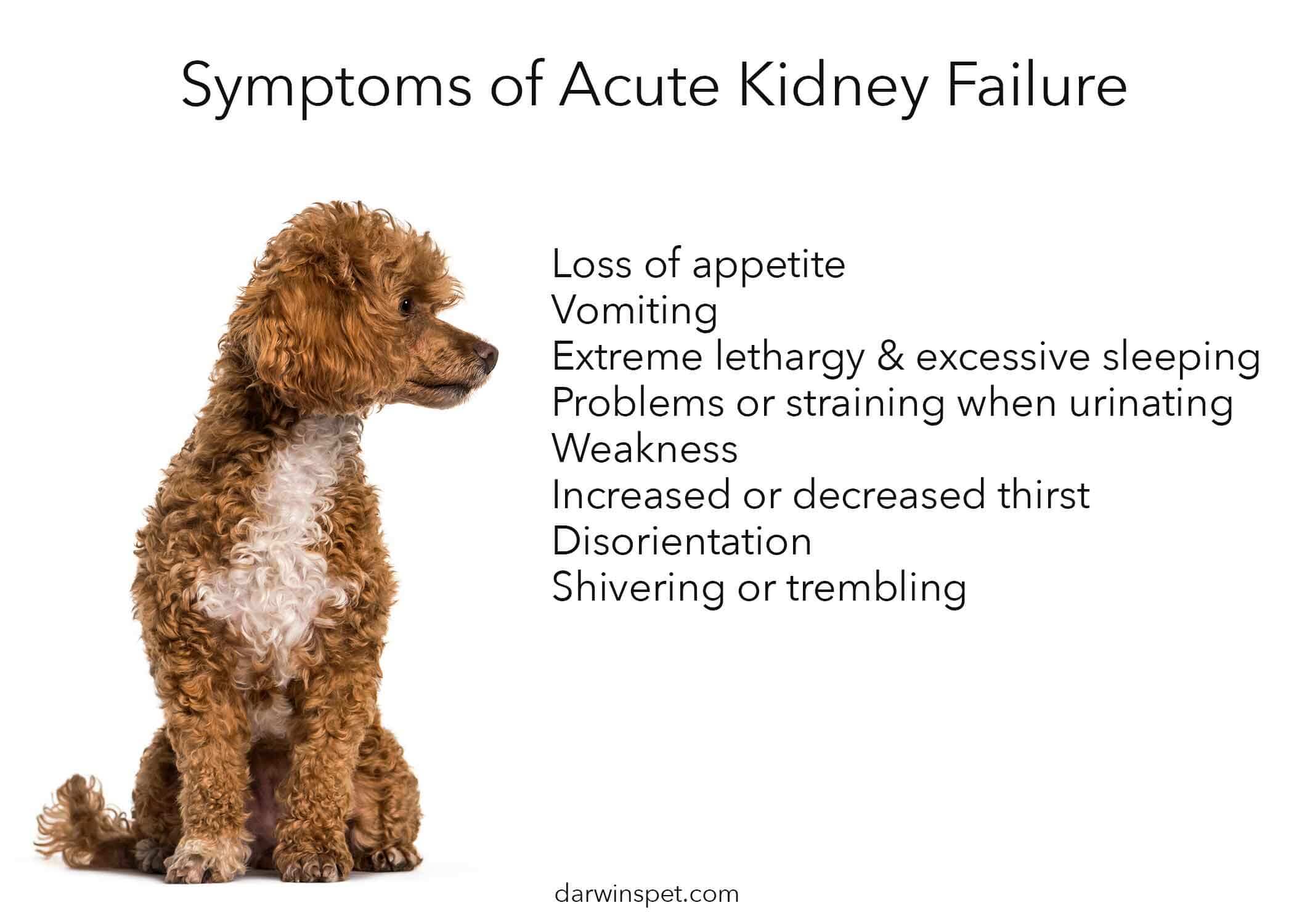Chronic kidney failure in dogs can lead to shaking or tremors, along with other symptoms such as stiffness and weakness in the legs. Neurological problems, inflammatory brain diseases, an underactive adrenal gland, and electrolyte disorders may also cause shaking in dogs.
If your dog is experiencing kidney failure and shaking, it is important to consult with a veterinarian for proper diagnosis and treatment. Management of kidney failure may include a warm and comfortable sleeping area, easy access to food and water, a prescribed kidney diet, administration of fluids as directed by the vet, and consistency with medications.
Providing comfort and support for a dog with kidney failure can help improve their quality of life.

Credit: www.matthews.carolinavet.com
Understanding Kidney Failure In Dogs
Kidney failure, also known as renal failure, is a common condition affecting dogs of all ages. It occurs when the kidneys are unable to effectively filter waste products from the blood or regulate important substances like electrolytes and fluid balance. This can lead to a buildup of toxins in the body and various health complications. Understanding the causes, symptoms, and treatment options for kidney failure in dogs is crucial for early detection and proper management of the condition.
Causes Of Kidney Failure
There are several factors that can contribute to kidney failure in dogs. These include:
- Chronic kidney disease (CKD): This is the most common cause of kidney failure in dogs. It is a progressive condition where the kidneys gradually lose their function over time.
- Acute kidney injury (AKI): This can occur due to dehydration, ingestion of toxins, certain medications, infections, or a sudden decrease in blood flow to the kidneys.
- Genetic predisposition: Some dog breeds are more prone to developing kidney disease, such as the Bull Terrier and the Cavalier King Charles Spaniel.
- Urinary tract obstruction: Obstructions like kidney stones or tumors can block the flow of urine, leading to kidney damage and eventually failure.
Symptoms Of Kidney Failure
It is important to recognize the symptoms of kidney failure in dogs, as early detection can greatly improve the chances of successful treatment. Common symptoms include:
- Increased thirst and urination
- Loss of appetite and weight loss
- Vomiting and diarrhea
- Lethargy and weakness
- Bad breath and mouth ulcers
- Changes in coat appearance
- Swelling in the legs and abdomen
Treatment Options For Kidney Failure
The treatment approach for kidney failure in dogs depends on the underlying cause and the severity of the condition. Some common treatment options include:
- Fluid therapy: This helps to flush out toxins and maintain hydration.
- Dietary changes: Prescription kidney diets are formulated to support kidney function and manage symptoms.
- Medications: Different medications may be prescribed to control blood pressure, lower phosphorus levels, and manage symptoms like vomiting or nausea.
- Regular monitoring: Regular blood tests and urine analysis are essential to assess kidney function and adjust treatment accordingly.
- Surgery or interventions: In some cases, surgical intervention may be necessary to remove obstructions or treat underlying conditions.
It is important to work closely with a veterinarian to develop a personalized treatment plan for your dog. They will consider various factors, such as the age and overall health of your dog, to determine the most appropriate approach to managing kidney failure.
Connecting Kidney Failure To Shaking In Dogs
When a dog has kidney failure, shaking can be a symptom. Other potential causes of shaking in dogs with kidney failure include neurological problems and inflammatory brain diseases. It’s important to consult with a veterinarian for a proper diagnosis and treatment plan.
The Relationship Between Kidney Failure And Shaking In Dogs
When dogs experience kidney failure, it can lead to various symptoms, one of which is shaking. Shaking, or tremors, can be a result of the kidneys’ inability to properly regulate essential substances in the body, such as electrolytes, which can directly affect the nervous system. In this section, we will explore the connection between kidney failure and shaking in dogs to help you better understand this worrisome symptom.
Other Possible Causes Of Shaking In Dogs
While kidney failure is a common cause of shaking in dogs, it is important to note that there are other potential causes as well. Some of these causes include neurological problems, such as inflammatory brain diseases, and conditions like an underactive adrenal gland or demyelinating disorders. Identifying the specific cause of shaking in your dog is crucial to ensure proper treatment and management.
Identifying Shaking As A Symptom Of Kidney Failure
If you notice your dog shaking or trembling, it is essential to consider kidney failure as one of the possible underlying causes, especially if your dog has been exhibiting other symptoms such as increased thirst and urination, weight loss, loss of appetite, and lethargy. Consulting with a veterinarian is crucial to properly diagnose kidney failure and develop an appropriate treatment plan.
During the diagnosis process, your veterinarian may recommend blood tests to evaluate kidney function and identify any electrolyte imbalances. These tests will help determine if kidney failure is indeed the cause of your dog’s shaking. Once a diagnosis is confirmed, your veterinarian will work with you to develop a comprehensive treatment plan that may include dietary changes, medication, fluid therapy, and other supportive measures.
Remember, shaking in dogs should never be ignored, as it can signal underlying health issues. If your dog is shaking, especially in conjunction with other symptoms, it is important to seek veterinary attention promptly. With early detection and appropriate treatment, you can help manage kidney failure and improve your dog’s quality of life.
Managing Kidney Failure In Dogs
When a dog has kidney failure, shaking could be a symptom of pain and discomfort. It is important to manage their condition through medication, a kidney-friendly diet, and providing them with a warm and comfortable environment.
Managing kidney failure in dogs can be a challenging and emotional journey. As a responsible pet owner, it is important to provide your furry companion with the best possible care and support during this time. Understanding the prognosis for dogs with kidney failure, knowing when to consider euthanasia, and providing supportive care are crucial aspects in managing this condition.Providing Supportive Care For Dogs With Kidney Failure
Supportive care plays a significant role in managing kidney failure in dogs. Here are some key elements to consider:1. A Warm, Comfortable Place to Sleep: Providing a cozy and comfortable sleeping area for your dog is essential. Make sure they have access to soft bedding and a warm space to rest, as they may experience fatigue and weakness due to their condition.2. Easy Access to Food and Water: It is crucial to ensure that your dog has easy access to fresh, clean water at all times. Additionally, a palatable kidney prescription diet, recommended by your veterinarian, can help support kidney function and manage symptoms.3. Consistent Medication: Administering medications as prescribed by your veterinarian is crucial for managing your dog’s condition. Follow the recommended dosage and schedule to ensure their medications are effectively helping to support their kidneys.4. Fluids Administered Under the Skin: In some cases, veterinarians may recommend subcutaneous fluid therapy to help support hydration and kidney function. This procedure involves injecting fluids under the skin, and it should only be done under the guidance of a veterinarian.Understanding The Prognosis For Dogs With Kidney Failure
The prognosis for dogs with kidney failure can vary based on the stage of the disease and the individual dog’s response to treatment. It is essential to discuss your dog’s prognosis with your veterinarian, as they will be able to provide you with a more accurate assessment based on your specific situation. Keep in mind that early detection, consistent supportive care, and close monitoring can significantly impact your dog’s prognosis and quality of life.When To Consider Euthanasia For Dogs With Kidney Failure
Making the decision to euthanize a beloved pet is never easy. However, when a dog with kidney failure reaches the advanced stages of the disease and experiences a significant decline in their quality of life, euthanasia may be a compassionate choice. Signs that may indicate it is time to consider euthanasia include constant pain, loss of appetite and drinking, incontinence due to complete kidney failure, and a general decline in overall well-being. Consult with your veterinarian to discuss the best course of action and make an informed decision. Remember, managing kidney failure in dogs is a complex process that requires teamwork between you and your veterinarian. By providing supportive care, understanding the prognosis, and considering euthanasia when necessary, you can ensure that your furry friend receives the best possible care throughout their journey with kidney failure.
Credit: www.pethealthnetwork.com

Credit: www.darwinspet.com
Frequently Asked Questions For My Dog Has Kidney Failure Why Is She Shaking
How Do I Know When To Put My Dog Down With Kidney Failure?
If your dog is constantly in pain, stops eating and drinking, or experiences incontinence due to complete kidney failure, it may be time to consider putting them to sleep.
How Do You Comfort A Dog With Kidney Failure?
To comfort a dog with kidney failure, provide a warm and comfortable place to sleep, easy access to food and water, a kidney prescription diet, administer fluids under the skin as directed by your veterinarian, and be consistent with medications.
How Long Does End Stage Kidney Failure Last In Dogs?
End stage kidney failure in dogs can last for a variable amount of time, depending on the individual dog and the effectiveness of treatment. However, in general, end stage kidney failure is a progressive condition and can lead to a poor quality of life for dogs in the later stages.
What Does Stage 4 Kidney Failure Look Like In Dogs?
Stage 4 kidney failure in dogs is characterized by severe elevations of kidney values in bloodwork. It can cause painful ulcers in the mouth, nausea, weakness, and poor quality of life. Dogs may experience tremors, stiffness, and weakness in the legs due to muscle twitching associated with kidney disease.
Conclusion
If your dog is experiencing shaking or tremors, it could be a symptom of kidney failure. Chronic kidney failure can lead to tremors, along with other neurological and adrenal gland-related issues. It is essential to closely monitor your dog’s condition, provide comfort, and follow the management tips provided by your veterinarian.
Remember, if your dog’s quality of life is severely compromised, you may need to consider euthanasia as a compassionate choice. Take appropriate measures and consult with your vet for the best care for your beloved pet.



